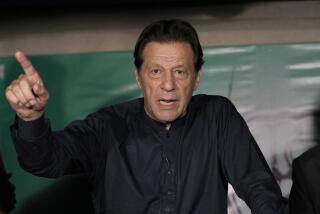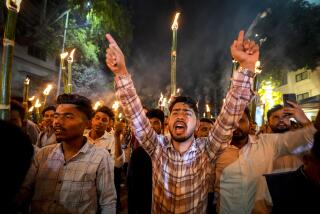Pakistan Court Strikes Parts of Islamic Bill
- Share via
ISLAMABAD, Pakistan — Pakistan’s Supreme Court on Thursday struck down portions of proposed legislation that would implement Taliban-style Islamic laws in a religiously conservative province that borders Afghanistan.
The decision by the top court is viewed as a victory for President Pervez Musharraf, who has called for a national policy of “enlightened moderation.”
Pakistan’s mainstream political parties and human rights groups also had opposed the North-West Frontier Province legislation, saying it would allow religious police to interfere in the private lives of citizens.
The legislation calls for prohibitions on unrelated men and women gathering in public places in the province and seeks to force residents to adhere to Islamic Sharia law, much like that imposed by the deposed Taliban regime in neighboring Afghanistan.
The provincial law minister, Malik Zafar Azam, said his government would revise the bill to address the court’s objections and present it to the provincial assembly for a new vote. He said it would retain provisions for a morality police.
The court’s ruling did not say the proposed police unit was unconstitutional, only that its proposed powers must be trimmed “to a great extent.”
The Hisba, or accountability, bill, was passed June 14 by a coalition of hard-line Islamic parties that dominated the provincial assembly, but it had not yet been signed into law.
Musharraf referred the legislation to the top court, saying it would create a parallel judicial system that would undermine judicial independence and deny citizens access to justice.
The federal minister for state information, Anisa Zeb Tahir Kheli, said the national government would not allow such a law to be imposed because of the negative image it would project abroad, particularly in the West.
The Islamic coalition that governs the province says voters gave it the authority to enact such laws in the 2002 election.
Khalid Anwer, lawyer for the provincial assembly, contended that Musharraf’s concerns were hypothetical and premature.
More to Read
Sign up for Essential California
The most important California stories and recommendations in your inbox every morning.
You may occasionally receive promotional content from the Los Angeles Times.













